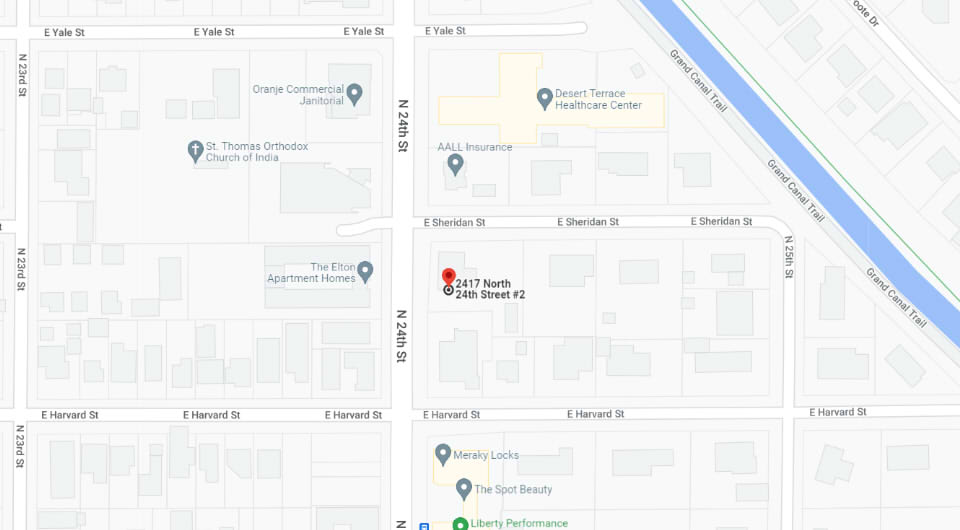If your healthcare provider failed to detect the warning signs for a serious medical condition and it wasn't discovered till later, you could have been a delayed diagnosis victim. Delayed diagnoses can have devastating repercussions, particularly in cancer cases and other serious conditions. You could be eligible to sue your physician for medical malpractice when they made an error that delayed the treatment or diagnosis of your condition, causing unnecessary damage.
If you have suffered any harm due to a delayed diagnosis, the Phoenix Personal Injury Attorney Law Firm can help make your path toward seeking compensation as seamless as possible. Contact us today to schedule your consultation with us.
Defining a Delayed Diagnosis
Delayed diagnosis typically entails signs, symptoms, concerns, and test findings that ought to have informed a reasonable medical professional that a medical condition needed to be diagnosed but the physician missed it at that moment. Medical malpractice can include any delayed diagnosis that results in harm or injury.
Healthcare providers are responsible for analyzing a patient's symptoms, medical history to make a diagnosis. The diagnosis serves as the starting point for the necessary treatment and therapy. For instance, when a patient visits the doctor and says they have a runny nose, cough, and sore throat, the physician might be able to perform a quick exam and diagnose them as having a common cold. The typical course of treatment entails staying hydrated, and warm, and getting lots of sleep.
However, other medical diseases and conditions could be far more difficult to diagnose. A variety of diagnostic procedures, including blood tests, tissue analysis, imaging (X-ray or MRI), and more, may be necessary before a clinician can make a diagnosis. Doctors have extensive expertise in patient diagnosis during their years of academic study, clinical practice, and training. Whenever the healthcare provider is unable to diagnose the patient, they may decide to keep evaluating them or send them to a specialist.
When a physician makes an incorrect diagnosis or misses to identify the warning symptoms of a serious disease, it may lead to major stress for that patient. If the patient's diagnosis is delayed, they might not receive the necessary care or treatment and instead be sent home. The condition can worsen further, resulting in pain, harm, and a lack of options for treatment. Once the correct diagnosis is made, it's usually too late to do anything about it.
Delayed vs. Wrong vs. Missed Diagnosis
Each type of diagnostic error differs in certain ways, especially if you're thinking about bringing a medical malpractice lawsuit. The patient's health worsens and advances in each case, usually to the point where it becomes too late to receive proper treatment and the individual could pass away as a result. The main differences between a delayed, wrong, or missed diagnosis include:
Delayed Diagnosis
The symptoms are ultimately diagnosed, although this does not happen right away.
Missed Diagnosis
The symptoms have not been accurately diagnosed.
Wrong Diagnosis
Symptoms are misdiagnosed as another ailment, and it could take some time before the true condition is recognized.
If you're not sure whether your situation fits into one of these categories and what legal options you have, you may want to speak with an attorney.
When Is a Delayed Diagnosis Considered Medical Malpractice?
Delayed diagnoses are not always considered medical malpractice. For instance, as stated above, a doctor can't be held accountable for giving a poor diagnosis if the patient chooses not to seek medical attention.
In a similar vein, a medical practitioner cannot be held responsible for malpractice when the patient fails to disclose relevant symptoms or details that might aid in a correct diagnosis.
In actuality, a doctor only engages in medical malpractice if the patient is injured as a result of their violation of the standard of care. The following instances show how a doctor could have perpetrated malpractice by making a delayed or incorrect medical diagnosis:
- A regular blood test reveals abnormal levels, but a doctor orders no additional tests.
- When a patient complains of certain symptoms, their physician dismisses them as being indicative of a less severe condition.
- The lab work for a patient is misplaced, messed up, or done wrongly.
- When every indication point to the fact that the patient should be referred to a medical specialist, and their doctor chooses not to do so.
- The doctor ought to have done more, like doing additional tests or requesting new information, but they didn't.
Additionally, the doctor had to act in a way that a reasonable medical professional in the same situation wouldn't have done or did not do something in a way that a reasonable medical professional in a similar situation would have.
Common Causes of Delayed Diagnosis
Common reasons for delayed diagnosis include:
- Lack of communication within a medical facility or hospital.
- Failing to have a thorough consultation with a patient.
- Inadequate patient screening before admission.
- Faulty or inadequate medical equipment.
- Insufficient space at the medical facility.
- Insufficient physical examination.
- Issues with the electronic patient record system.
Naturally, the onset and development of significant medical diseases sometimes take a while. A physician cannot be held legally liable for negligence when, at the moment of your hospitalization, they couldn't make the proper diagnosis. You must demonstrate that your doctor, surgeon, or nurse, went beyond the "recommended standard of duty" by failing to provide you with an accurate prompt diagnosis to file a claim for delayed diagnosis.
The "degree of care" is what you would anticipate from a healthcare professional with similar training in a situation like yours. Although certain medical delays could be justifiable, diagnostic delays induced by a physician's carelessness could entitle you to receive financial compensation should you suffer catastrophic injuries.
The Consequences of Delayed Diagnoses
When patients have cancers or other serious illnesses, it is very critical to diagnose and deliver the right treatment as soon as possible. An illness, cancer, or another medical issue can be treated more effectively and quickly if it is diagnosed and treated as soon as possible when it is discovered. When treated late, treatable conditions can worsen and become far more life-threatening, especially cancer, which can occasionally be stopped in its tracks if diagnosed early.
Most of these mistakes occur because clinicians are reluctant to order adequate or proper diagnostic procedures. Additionally, many people regrettably have both a misdiagnosis and a delayed diagnosis, when a misdiagnosis eventually leads to delayed diagnoses of the correct and actual disease.
Medical professionals' mistakes in reading tests or x-rays, losing test findings, or not performing the right tests are major causes of misdiagnoses and subsequent delays in treatment. These kinds of claims are frequently connected to conditions like:
- Aortic dissection.
- Breast cancer.
- Pulmonary embolism.
- Lung cancer.
- Colorectal cancer.
- Prostate cancer.
- Testicular cancer.
- Cervical cancer.
Unfortunately, nurse practitioners in certain clinics also work closely with patients in person before or after consulting with a physician, so these mistakes are not merely restricted to doctors. Since they lack similar training as doctors, nursing practitioners are also susceptible to making errors in diagnosis. Delays in diagnosis could involve several medical specialists and have an impact on the patient's health.
Building a Solid Case for Medical Malpractice
If a patient's medical team's negligence was directly to blame for the errors, they are most likely to file a claim for medical malpractice after delayed diagnoses. Or, to put it another way, the physician must have failed in his or her responsibility to that patient.
Additionally, patients should be able to demonstrate that the error directly caused their damages. This might entail more medical costs, lost wages, or suffering and pain. Let's look more closely at the two crucial components for developing a solid medical malpractice case after delayed diagnoses.
Negligence
If a doctor does the most common screenings, examinations, and procedures based on the symptoms reported by the patient, but an error in diagnosis still happens, it's not likely that they would be held responsible for any damages that result from it. Patients who suffer from diagnostic mistakes will only have a case if another doctor with a similar specialization would have acted differently in a comparable scenario, resulting in a different result.
The following are some examples of common forms of malpractice that could potentially result in delayed diagnoses:
- Failing to identify clear signs of illness.
- Ignoring the obvious relations between a patient's symptoms and different medical conditions.
- Not taking enough diagnostic images.
- Misreading diagnostic images.
- Not conducting additional tests when the findings are unclear in any manner.
Damages
In certain circumstances, a delayed diagnosis doesn't cause damage. For instance, if a healthcare provider immediately reevaluates a patient after realizing there was an error during the initial examination, this could avoid unnecessary delays in diagnosis.
If you want to sue a doctor for medical malpractice, you need to be able to show that the medical professional's carelessness caused you to incur real financial harm. An experienced personal injury attorney could be able to offer assistance in this situation. An experienced lawyer can look into the circumstances to identify the kinds of damages you might have suffered and assist you in putting together evidence linking those losses to your delayed diagnosis.
Damages that can be recoverable as a result of delayed diagnoses include:
- Medical costs.
- Physical suffering and pain.
- Lost income, benefits, and wages.
- Emotional distress.
- Mental suffering.
- The inability to enjoy life.
Arizona's Statute of Limitations for Filing a Delayed Diagnosis Claim
In Arizona, a patient's claim for a missed diagnosis or delayed diagnosis has a time limit known as the statute of limitations. It is usually two years after the delayed diagnosis.
When a patient's condition or injury was not obvious right away, the statute of limitations could be extended. The statute of limitations in this case will begin to lapse on the day the condition or injury becomes apparent or ought to have been found by using reasonable care.
If you need to know whether you have time to file a medical malpractice claim in Arizona, you should speak with a lawyer with experience in this field.
Immunity From Arizona Medical Malpractice Claims
Arizona law restricts a patient's ability to sue a Health Maintenance Organization for medical malpractice. Patients who have health maintenance organizations (HMOs) as their primary care providers are only allowed to file claims in federal courts for financial losses, not for non-economic damages such as suffering and pain.
In addition, the following do not constitute grounds for holding a healthcare provider liable in Arizona should a patient sustain an injury due to a delayed diagnosis:
- The healthcare provider wasn't compliant with a direction or a decision that infringed on their conscience when the healthcare professional promptly expressed their reluctance and swiftly passed on the duty of handling the patient to a different provider that was prepared to take action according to their direction.
- The healthcare professional did not consult a disabled or incapacitated patient's surrogate when the surrogate wasn't able to be reached after the practitioner made an honest attempt to do this, or when an emergency was present that failed to allow the healthcare provider enough time to find and speak with the patient's surrogate.
- The healthcare provider referred to a patient's court order.
Speak to a skilled Arizona medical malpractice lawyer for more details on legal actions against HMOs.
Choosing a Phoenix Medical Malpractice Attorney
Picking an experienced medical malpractice lawyer for your delayed diagnosis claim can be an intimidating task. You require a skilled team of legal professionals who will put together a solid claim for you while keeping you updated on the status of the proceedings.
You must interview your prospective counsel comprehensively during the first meeting with them. Find out how much your attorney knows and what experience they have in the field of medical malpractice. Ask them if they have dealt with cases like yours in the past and what outcomes those cases had.
Find out what the legal firm charges for services. Read all contingency agreements before signing. Ensure that you are aware of any costs that you might have to cover yourself. Consider whether or not you feel comfortable working with your prospective lawyer. You also should have no trouble communicating and exchanging information regularly.
Frequently Asked Questions
Below are some frequently asked questions on delayed diagnoses in Arizona:
Can You File a Lawsuit For a Delayed Diagnosis in Arizona?
You may be able to file a legal action against a physician for delayed diagnoses if the conditions precedent for such a claim is satisfied. A medical malpractice claim typically requires that the delay in diagnosis be a consequence of the healthcare professional's negligence. A patient who has a serious medical condition could be particularly at risk from a delayed diagnosis.
Sadly, delaying diagnoses are a common occurrence in healthcare. However, many cases are not the provider’s fault. It is essential to remember that the degree of care to which a physician is held varies greatly from that which the general population is subjected to.
What Factors Contribute to a Delay In Diagnosis?
There could be several causes for a physician to be negligent and delay making a diagnosis. For example, there might be problems with a patient's test results. Another possibility is that the doctor doesn't pay enough attention to the patient's symptoms or won't draw the necessary conclusion that the patient has a medical problem.
Doctors can miss the mark on diagnosing any illness, but certain conditions are more likely to be misdiagnosed than others. These include:
- Heart attacks.
- Strokes.
- Cancer.
- Internal bleeding.
- Brain injuries.
- Infections.
Serious diseases and illnesses are often misdiagnosed because they may initially present with seemingly minor symptoms which medical professionals fail to connect to their root cause.
Why Is It Important to Have a Copy of Your Healthcare Records?
In most cases, patients receive medical care from multiple doctors. While your primary care doctor typically oversees the treatment you receive, it's common for your specialized doctors to be distanced from one another or to miss out on crucial information about a person's medical history. Your doctors' inability to communicate with each other can result in errors and other issues.
Among the most effective ways to prevent issues is to retain medical record copies and take them with you when going to visit the doctor. This does not imply you should carry around a mountain of paper records.
However, it is advised that you bring your most recent medical records to your appointments. Don't assume your orthopedist, endocrinologist, or cardiologist has reviewed your medical records or knows everything they need to know about your health.
Find a Arizona Medical Malpractice Lawyer Near Me
If you are a victim of a delayed diagnosis, you can seek legal advice from the Phoenix Personal Injury Attorney Law Firm. A skilled attorney can assess your situation and advise you of your legal options. Take your injuries seriously and speak with a lawyer as soon as you can because you only have limited time to bring a medical malpractice case. Call us today at 602-641-9589 to schedule your consultation.










